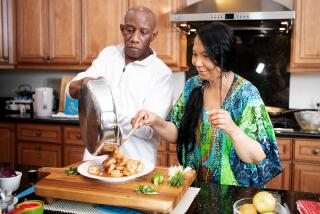When Cooking Is a Group Effort : Leisure: Cooking clubs can provide a way to eat well while sharpening culinary skills.
- Share via
Cooking clubs are as varied as the dishes their members prepare. If you’re interested in forming one with friends or neighbors, here are some tips to make sure many cooks in the kitchen don’t spoil the broth:
--Organize the cooking to accomplish particular goals. If you just want to eat well, assign each guest a dish or course to bring; the host can prepare one course or only be responsible for the setup, cleanup and beverages. If the goal is to share expertise and to learn new techniques, cook as a group, assigning each person a task. That way, everyone will learn how to make the dish, and no single member will be burdened with too much work. Cooking together renders failures more acceptable and less threatening, provides more opportunity to learn from each other and analyze the procedures, and is generally more fun.
--Settle ahead on a budget and the method for sharing expenses (usually adding up everyone’s bills and dividing equally). Avoid buying ingredients that are expensive when the recipe calls for only a small proportion of the package--a tablespoon of Madeira wine, for example. If no member has a bottle of Madeira from which to donate a tablespoon, substitute with another flavoring or split up the leftover wine among members.
--In planning the menu, consider the dinner as a whole. Including several heavy, rich or complicated dishes may start as a challenge but finish as an invitation to indigestion. Consider a theme, perhaps ethnic or seasonal. Select dishes that use techniques you would like to practice, such as souffles, poached or steamed fish, or puff pastry.
--Choose recipes carefully. They should suit taste, be worth the effort, not take longer or cost more than you are willing to spend and fit the rest of the menu. If you are tackling difficult recipes that are unfamiliar, choose from sources--such as the cookbooks of Julia Child or Madeleine Kamman--that include a lot of instruction and tips with the recipe. Keep in mind that some recipes won’t work, and chalk them up to education.
--Select dishes that can be prepared in the allotted time with plenty of leeway for missteps. If preparing dishes that take more than two hours, assign some do-ahead steps (such as stock-making) to members. Have food to nibble and beverages available for the cooks while they work, or prepare a quick hors d’oeuvre at the beginning.
--If it is necessary to buy dishes and glasses for a large group, check restaurant-supply houses before you consider disposables or buy at retail stores. A case of wine glasses or gilt-rimmed plates might cost less than three dinners’ worth of disposables.
--Decide cleanup division ahead of time. Everyone might stay to the bitter end, or you might compensate the host with less work or expense in return for doing the cleanup.
--Agree ahead of time whether children are going to be included in the cooking and the dining. Set guidelines for their supervision so a parent is not expected to chase after a toddler while cooking the crepes.
--A cooking club should be cooperative rather than competitive. Find out what each member would like to learn to do and what each does particularly well and could teach the others.
--Above all, don’t tackle too much, whether it’s too many dishes or too complex a meal. Fun should be calculated into the formula.
More to Read
Eat your way across L.A.
Get our weekly Tasting Notes newsletter for reviews, news and more.
You may occasionally receive promotional content from the Los Angeles Times.










